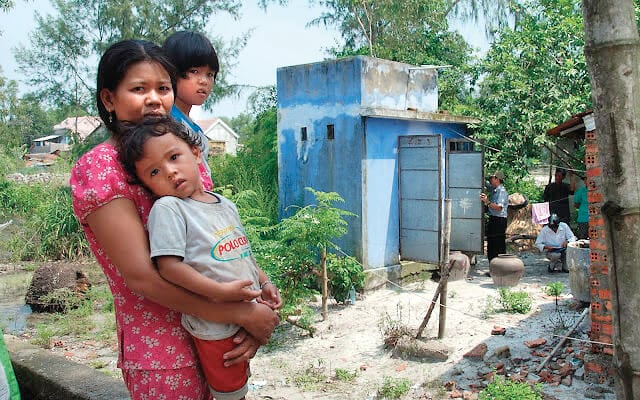Meet the Winner: iDE
The CEO of iDE, Al Doerksen, doesn’t mince words as to why international development projects are important.
“Poverty sucks. There’s nothing glorious about a roof that leaks … about having your child ill and you can’t afford the medicine,” he says. iDE is looking to change all of this, not by handouts, but by investments.
“Our mission has been not to give money to people, [but] to create opportunity for people to increase their income and their livelihoods,” Doerksen explains.
iDE Cambodia’s Sanitation Marketing Program, one of its ongoing projects, does this by working with local vendors to build and sell low-cost latrines. By utilizing the market, iDE has created a program that is sustainable and impactful: Local vendors profit from the sales and are able to better support their families, while local consumers have access to proper sanitation. More than 10,000 latrines have already been sold.
 “One of the striking things we found about iDE is how they’ve really changed the mindset of the people they work with on the ground in Cambodia,” notes Allyson Davis, a Fels Institute master’s candidate who visited iDE’s sites in Cambodia as a member of the Lipman Family Prize student selection committee.
“One of the striking things we found about iDE is how they’ve really changed the mindset of the people they work with on the ground in Cambodia,” notes Allyson Davis, a Fels Institute master’s candidate who visited iDE’s sites in Cambodia as a member of the Lipman Family Prize student selection committee.
Because of iDE, intergovernmental organizations and other independent development organizations “are on the same page: that handouts and subsidies don’t work,” according to Davis.
Meet the finalist: Komaza
A Google search and a three-month backpacking tour led to an organization that has changed thousands of lives with the potential to affect millions.
Tevis Howard spent a year after high school doing immunology research in Kenya. While a student at Brown University, Howard made frequent trips back to Kenya to continue this research. His path veered away from science after a three-month backpacking trip through Kenya and Tanzania. Howard returned home and began researching the extreme poverty of dry-land farmers found throughout Kenya. His studies spurred Howard to create dozens of business plans, but he decided to focus on what was unique, innovative and impactful: microforestry.
Howard founded Komaza in 2008 to create long-term relationships with dry-land farmers in Kenya, helping them to plant and care for trees in arid regions where nothing else will grow.
Komaza plans to help these farmers get the most money for their product. Rather than have farmers sell their tree as a raw pole for  $40, Komaza will eventually be able to help that same farmer turn their tree into a processed electricity pole worth $150.
$40, Komaza will eventually be able to help that same farmer turn their tree into a processed electricity pole worth $150.
“We want to get people out of extreme poverty, and that requires making huge amounts of money for them. Our aspiration is to triple people’s income,” Howard explains.
Komaza has already helped plant more than a million trees. Jessica Simmons, SPP’12, who visited Kenya as a member of the student selection committee, recalls a farmer who was able to afford electricity because of Komaza’s influence.
“Komaza is a game-changer,” she says. “Nothing short of unbelievable.”
Meet the finalist: MedShare
MedShare takes the adage “your trash is someone else’s treasure” seriously. The Atlanta-based organization collects surplus medical supplies and equipment in the United States and distributes them to qualified medical facilities and personnel in the developing world.
The work results in a triple return on investment, according to MedShare CEO Meridith Rentz.
 “You’re not only getting humanitarian aid because you’re shipping life-saving medical supplies and equipment to countries where they’re desperately needed. You’re providing a real significant impact on the environment here locally. MedShare has kept more than 2 million cubic feet of medical supplies out of the landfill since we started 14 years ago—and then you get this amazing community-building civic aspect of it,” she explains.
“You’re not only getting humanitarian aid because you’re shipping life-saving medical supplies and equipment to countries where they’re desperately needed. You’re providing a real significant impact on the environment here locally. MedShare has kept more than 2 million cubic feet of medical supplies out of the landfill since we started 14 years ago—and then you get this amazing community-building civic aspect of it,” she explains.
In 14 years, MedShare has shipped 750 forty-foot ocean containers—each with 1,000 boxes of supplies and 20 to 30 pieces of medical equipment—to 88 countries. About 18,000 volunteers and 37 staff members help organize these shipments and inventory in MedShare’s warehouses in Atlanta and San Francisco.
Kim Leichtner, a Fels Institute master’s candidate, was able to visit MedShare’s warehouse in Atlanta and learned what “surplus” can mean.
She helped unpack and pack boxes of gauze, which were unusable  stateside because of dents in the exterior packaging. These are the kinds of products MedShare keeps out of the landfill and puts to good use.
stateside because of dents in the exterior packaging. These are the kinds of products MedShare keeps out of the landfill and puts to good use.
Several U.S. markets still don’t have a system to utilize surplus supplies.
“The ultimate vision that we have is that every health system in the United States—and I would say even globally—has a responsible, high-quality way for their surplus to be recovered,” Rentz says.


























